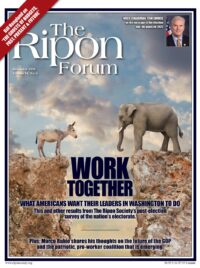 The Founders of the United States distrusted centralized power, and the election of 2020 shows just how brilliant they were. Americans don’t hold one national election. Instead they hold 50 mini state elections, where each state is empowered by the Constitution to govern their own affairs by setting the rules of their own elections.
The Founders of the United States distrusted centralized power, and the election of 2020 shows just how brilliant they were. Americans don’t hold one national election. Instead they hold 50 mini state elections, where each state is empowered by the Constitution to govern their own affairs by setting the rules of their own elections.
The Founders knew that central control and national rules were a threat to liberty. I agree because I worked as an attorney at the Department of Justice Voting Section and got to know the people who would be managing national election standards – if we had them.
Make no mistake: any national federal standard — whether it be voter ID, absentee ballot availability, or even voter qualifications — would be enforced with a decidedly Democratic Party bias. Even during the Trump administration, a presidency built on “draining the swamp,” the swamp thrived. The entire culture of Washington D.C. is built to lean left. The attorneys and staff at the Justice Department or any federal agency, if they had the power to enforce national election procedure standards, would enforce them to help Democrats.
Any national federal standard — whether it be voter ID, absentee ballot availability, or even voter qualifications — would be enforced with a decidedly Democratic Party bias.
How do I know this? Because I watched it happening live over those areas where there were national standards. For example, the National Voter Registration Act mandated national standards for voter registration and cleaning rolls. Those guardians of national standards at the Justice Department in 2009 decided to just not enforce the law regarding keeping rolls clean.
They didn’t like the national standards requiring reasonable list maintenance practices, so they decided not to enforce that law.
At the same time, they were eager to enforce the part of the National Voter Registration Act to force states to register voters at welfare offices and even methadone clinics, the latter being part of a consent decree with Rhode Island.
Washington is a one-way ratchet. When Washington has power over the election process, the left wins, period. There are no exceptions.
We already have national standards for election day. Passed in 1845, the first Tuesday after the first Monday in November is election day. Yet now, that national standard is ignored with some states engaging in a more than a month of early voting, a Democratic Party priority. In 2020, we saw Pennsylvania accepting ballots in the mail after the election for days, even if they had no postmark.
Election day is now election months. That national standard for election day is flatly ignored.
We also have a national standard for a federal voting form. When anyone fills out this form, they must be registered to vote under federal law. While the form has a question about citizenship, non-citizens routinely fill out the form either by mistake or intentionally. Those vaunted national standards, however, prevent states from verifying citizenship. Congress made sure of that. Local election officials have to take the federal national form at face value and accept it.
When Washington has power over election process, the left wins, period. There are not exceptions.
Once again, a “national standard” ends up benefiting those who benefit from aliens voting in American elections.
Here’s the other dirty secret advocates of “national standards” don’t understand. There are dozens of well-funded groups like the ACLU, Common Cause, and the League of Women voters who are hyper-funded to enforce national standards they like and block national standards they don’t like. These third parties have an army of litigators to bend and twist national standards to their ideological aims. The right has a tiny fraction of the resources to oppose them. And in the end, national standards again become a one-way ratchet.
States are sovereign over their own affairs and can adapt election systems to their own sensibilities. In Maine, they roll voting machines into the prisons. In other states, a felony conviction means a lifetime ban on voting. That’s how the system was designed to work.
The Founders wanted decentralized elections because decentralized control promotes liberty. No single malevolent actor can influence the outcome of an election. The Electoral College is a decentralized body that gives power to state legislatures ultimately to name electors. This is because we are a union of states, not a kingdom. Decentralized control means power is diffused and citizens of each state are closer to the process of elections. I have worked with the people who would exercise power over national election standards, and I promise you don’t want them in charge of anything.
J. Christian Adams served in the Justice Department Voting Section attorney, is a New York Times bestselling author, Commissioner on the United States Commission for Civil Rights, and President of the Public Interest Legal Foundation.




